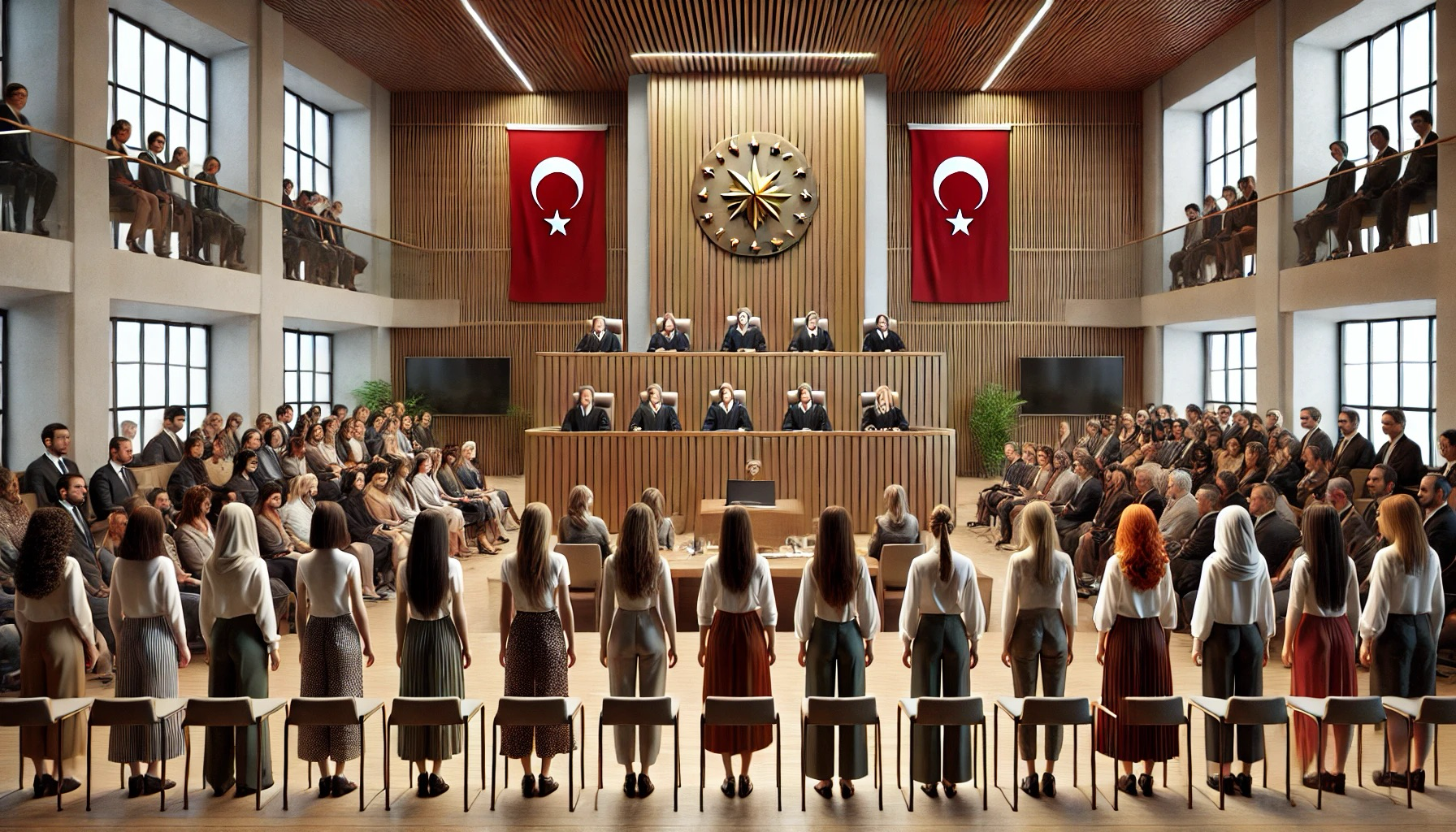Today, December 12, 2024, is an important day in terms of demonstrating the damage to society when the judiciary is used as a weapon. Today is the continuation of the trial known as the “Daughters’ Case” in Turkey. This unlawful trial has attracted attention both for the illegality of the trial process and for the reactions it has caused in international public opinion. The absurd allegations in the indictment of the case, together with the reports of international human rights experts and the reactions of prominent personalities, reveal the extent to which the foundation of the legal system in Turkey has been shaken and has become much more open to criticism.
The trial began with an operation on May 7. A total of 53 people, including 15 children between the ages of 12 and 17, were detained, their homes searched and linked to “membership in a terrorist organization”. As part of the operation, 15 girls, who were detained without the knowledge of their families and interrogated without a lawyer, were kept in the Üsküdar Children’s Branch Directorate for 16 hours without food or water and prevented from seeing each other or their families. As later reported by news sources, the detained children said after their detention, “There was a female police officer standing over you in the police station. We asked her, ‘Why are we here? She told us, ‘You will see inside, they will make you vomit blood. For example, one policeman passed by and she pointed at him and said, ‘This one will make you vomit blood. We didn’t understand why we were there. What have we done to make us vomit blood?” as they tried to explain the shock they were experiencing. The seriousness of the pressure and threats that were put on them with the statements that they would be “made to vomit blood” is clear.
Although Ömer Faruk Gergerlioğlu, a Kocaeli MP from the Peoples’ Party for Equality and Democracy (DEM), in his answer to the written parliamentary questions he submitted to Interior Minister Ali Yerlikaya, based on the statements of the detained children, in which he mentioned the age of the children and the illegality of the case, stated that the child whose statement was taken was not taken as a suspect, that he was only questioned for his information and that he was not a party to the case, the fact that the children were taken from their homes in a dawn raid at around 5 a.m. instead of being taken to the police station at 5 a.m. is clear.The fact that the children were taken from their homes in a dawn raid at around 5:00 a.m., instead of taking statements upon invitation, shows that the operation was carried out precisely with the motive of “making the children vomit blood” with their own statements.
Indictment and trial
As a result of the operation, an indictment was filed against 41 people, 19 of whom were arrested, including 15 high school students. The 529-page indictment No. 2024/6636, which was prepared by the Istanbul Chief Public Prosecutor’s Office on June 10, 2024, was accepted by the Istanbul 24th High Criminal Court and the trial process of the case, known as the “Daughters’ Case”, began.
In the indictment, the defendants were charged with 117 different activities, all of which were legal and non-criminal, under the name of “terrorist acts”, in addition to the fact that 12 young university students gave English and religious lessons to middle and high school students.
Most of the documents presented as evidence consist of “information notes” and “information transmissions” prepared by the police departments, which can only be taken into account if they are supported by legal and concrete data, as stated in the decisions of the Court of Cassation (16th CD 16.04.2019 T, 2018/3918 E. 2019/2665 K.). Moreover, if one examines the content of the indictment, it is clear that these children and adolescents are “accused” of activities such as bowling, studying together, and ordering food. These absurd accusations, the data used as evidence and the “information notes” show how legal(!) the process is and raise deep concerns about the reliability of the legal system.
On the 5th day of the first hearing of the trial with absurd accusations and allegations, the court decided to release 11 people and left the case of the remaining detainees for the next hearing to be held on December 12-13. The fact that Şenol Kartal, the president of the Istanbul 24th High Criminal Court, where this absurd trial was held, decided to continue the detention of Aysu Bayram, a liver transplant recipient and Parkinson’s disease patient, who is also on trial in the same case, has also revealed the human dimension of the case. This has led to harsh criticism not only in terms of law, but also in terms of conscience and humanitarian values.On the other hand, in the case where 37 of the defendants are women, 8 of the 19 defendants between the ages of 18 and 25 are in pre-trial detention, and it is recorded that these young girls were between the ages of 10 and 17 at the time of the “coup attempt” on July 15, 2016. This data alone shows that the detention of military students under the age of 15 during the “coup attempt” under the pretext of “pay phone calls” was motivated by hatred and hate rather than law.International Reactions
International Reactions
The international community and public opinion have closely followed the developments in the case, noting that one of the black marks on Turkey’s human rights record has become more visible.
Commenting on the case, Prof. Dr. Antonio Stango said that the indictment was a “legal scandal” and that “portraying basic educational activities such as studying as a terrorist act is not only against the law, but also a challenge to international conventions on children’s rights.”Antonio Stango said that the Turkish judiciary had “clearly violated fundamental principles of international law” in this case.
“This case shows not only how the Turkish judiciary has become a political tool, but also how fundamental children’s rights are systematically violated,” said Nacho Sanchez Amor, the European Parliament’s rapporteur on Turkey.
The Greek newspaper Kathimerini, in its coverage of these illegalities, also pointed out that the case could damage Turkey’s international standing, stating that “violations of children’s rights will be a decisive factor in the EU’s negotiations with Turkey.
On the other hand, world-renowned chess master Garry Kasparov was not insensitive to the illegality and called for support on social media.
International children’s rights and conventions
The United Nations Convention on the Rights of the Child requires states to have the “best interests of the child” as a primary consideration. However, the events in this case in Turkey clearly demonstrate that these principles of children’s rights have been violated.
Human rights foundations and various international NGOs have emphasized that the children in this case have been subjected to “psychological trauma” that could lead to irreversible damage. The stories of children taken from their families and abused have drawn the attention of the international community to this case.
Conclusion
The “Girl Child Case” is a black mark on Turkey’s human rights record. Through this case, international jurists have exposed the use of the legal system as a tool of governance. The growing public pressure on the case in Europe and elsewhere calls into question Turkey’s obligations under international human rights treaties.
The future of the law depends on ensuring that justice is done in cases like this. As Antonio Stango said: “This trial will be a test not only of the pursuit of justice, but also of human dignity.”


